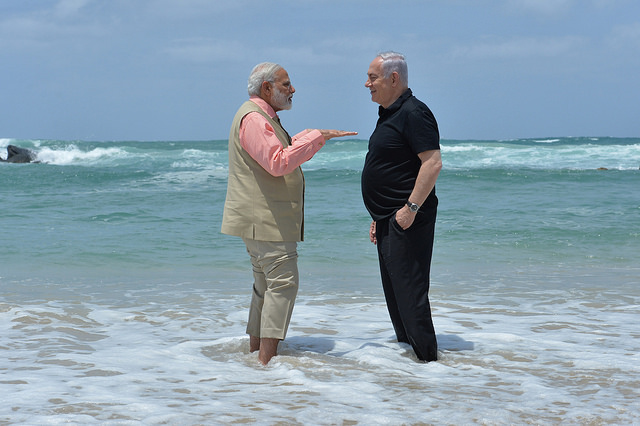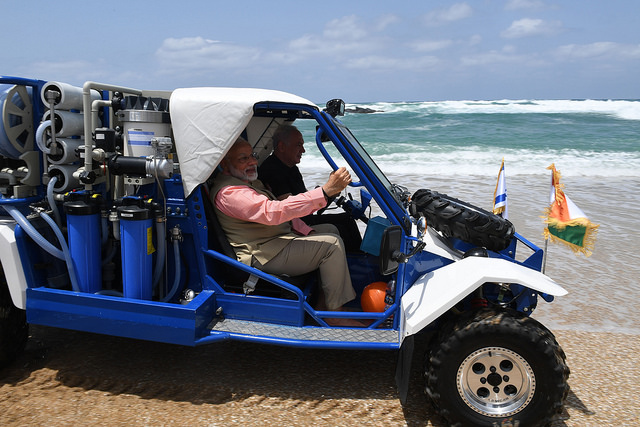As Netanyahu drinks water from a new Israeli mobile desalination technology with the visiting Indian prime minister, Israel’s actual desalination plant, planted firmly next to Gaza, stares down the consequences of Israel’s disastrous policies: raw sewage flowing its way.
By Hagai El-Ad

Last week, the prime ministers of Israel and India posed for a relaxed photo-op together, wading into the Mediterranean Sea on an Israeli beach. The fun day, complete with a demonstration of a new desalination device attached to an ATV, was apparently so idyllic that Netanyahu later enthused on Twitter: “There’s nothing like going to the beach with friends!”
New Delhi is about 2,500 miles away, but just 60 miles south, along the same coastline, is Gaza. It is so close that the raw sewage flowing into the sea from Gaza’s incapacitated wastewater treatment plant has become a health hazard for Palestinians and Israelis alike. Unlike Gaza’s sewage treatment plant, which lacks the electricity necessary to function, Israel’s desalination plants have all the power they need. But the sewage flowing north in the Mediterranean from Gaza has become a practical problem for Israel, polluting the sea water meant for desalination.
The shot of the two men grinning on the beach was a poetic, tragicomic testament to the extent of Israel’s repression and dream world. Our neighbors are Gazans, not Indians. Our desalination plants are firmly dug into the Mediterranean coast, not attached to four-wheel drive vehicles. And when Gaza has no power, we all swim in refuse. But Netanyahu is banking on Indian support to continue controlling the Palestinians without paying the price internationally. Even if he is successful, will that change the fact that our fates are inseparably entwined with that of the Palestinians?

Just two hours’ drive from Tel Aviv, almost two million people are living in third world conditions. That is a recipe for disaster – and the excrement floating on our waves is just the tip of the iceberg. The majority of Gazans are young, educated – and unemployed. Most of them were born after 1967. While the direct Israeli occupation of their childhood was replaced by external forms of control, they still live at the mercy of Israel’s whims. Not sure about that? Just consider this: it is entirely Israel’s choice whether to allow Gaza to treat its sewage or pollute the sea. If Netanyahu decides to turn Gaza’s power back on, the sewage treatment plant in Beit Hanoun can kick back into motion.
Three years ago, Israel bombarded Gaza. The Palestinian death toll was the most horrifying of any Israeli campaign since 1948, and included some 500 minors. If Gazans cannot envision a future that includes electricity, employment, potable water and the possibility of going to the beach – not to mention, to travel abroad – that means one thing: we are sentencing our neighbors to despair in the short term, and all of us to a future of violence. Gaza cannot forever remain a huge open-air prison supervised by drones and sentry tech systems, with artillery and bombs sent in to quell the inmates every few years.
In the area between the dwindling Jordan River and the polluted Mediterranean Sea, there is a single power directly or indirectly governing everyone’s lives: Israel. Meanwhile, Gaza is sweltering with almost no electricity. To be sure, Hamas has done its part to make matters worse, the Palestinian Authority has a share in the responsibility, and Egypt is hardly blameless; every party has interests in exacerbating the situation. But what about the human interest – the one shared by all the people who live along the Mediterranean coast, from Deir al-Balah to Ashkelon, from Gaza to northern Israel? We all swim in the same sea. Unless we set sail for a different future, we will sink under the waves together.
Hagai El-Ad is the executive director of B’Tselem. A version of this article also appears in Hebrew on Local Call.
